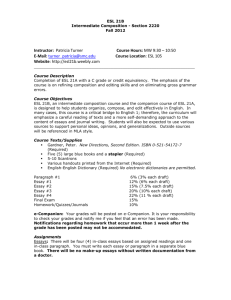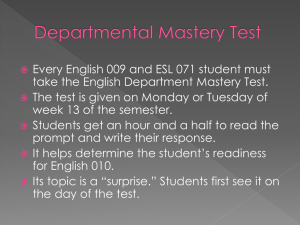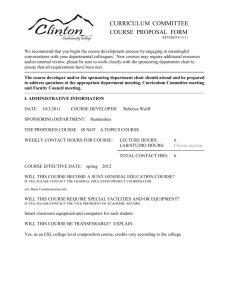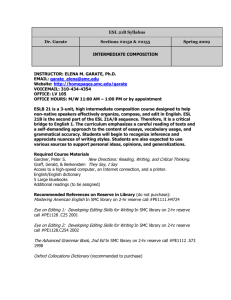Instructor: Patricia Turner
advertisement
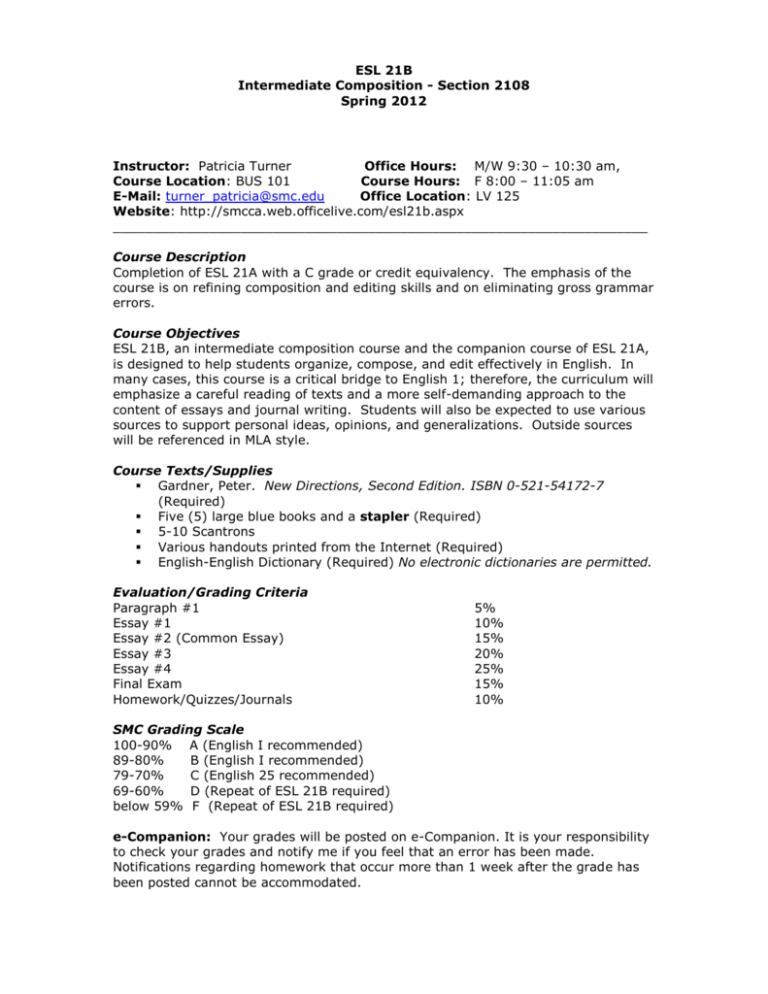
ESL 21B Intermediate Composition - Section 2108 Spring 2012 Instructor: Patricia Turner Office Hours: M/W 9:30 – 10:30 am, Course Location: BUS 101 Course Hours: F 8:00 – 11:05 am E-Mail: turner_patricia@smc.edu Office Location: LV 125 Website: http://smcca.web.officelive.com/esl21b.aspx ___________________________________________________________________ Course Description Completion of ESL 21A with a C grade or credit equivalency. The emphasis of the course is on refining composition and editing skills and on eliminating gross grammar errors. Course Objectives ESL 21B, an intermediate composition course and the companion course of ESL 21A, is designed to help students organize, compose, and edit effectively in English. In many cases, this course is a critical bridge to English 1; therefore, the curriculum will emphasize a careful reading of texts and a more self-demanding approach to the content of essays and journal writing. Students will also be expected to use various sources to support personal ideas, opinions, and generalizations. Outside sources will be referenced in MLA style. Course Texts/Supplies Gardner, Peter. New Directions, Second Edition. ISBN 0-521-54172-7 (Required) Five (5) large blue books and a stapler (Required) 5-10 Scantrons Various handouts printed from the Internet (Required) English-English Dictionary (Required) No electronic dictionaries are permitted. Evaluation/Grading Criteria Paragraph #1 Essay #1 Essay #2 (Common Essay) Essay #3 Essay #4 Final Exam Homework/Quizzes/Journals 5% 10% 15% 20% 25% 15% 10% SMC Grading Scale 100-90% A (English I recommended) 89-80% B (English I recommended) 79-70% C (English 25 recommended) 69-60% D (Repeat of ESL 21B required) below 59% F (Repeat of ESL 21B required) e-Companion: Your grades will be posted on e-Companion. It is your responsibility to check your grades and notify me if you feel that an error has been made. Notifications regarding homework that occur more than 1 week after the grade has been posted cannot be accommodated. ESL 21B Intermediate Composition - Section 2108 Spring 2012 Assignments Essays: There will be four (4) in-class essays based on assigned readings. You must write each essay in a separate blue book. There will be no make-up essays without written documentation from a doctor. Final Exam: The final exam has two parts: a writing/grammar exam and an essay. You will be notified of all exam dates in advance, so plan accordingly. There will be no make-up exams. You must take the final exam to pass the course. Homework: Homework is assigned for every class. Students must complete the homework to succeed in the class, as classroom activities depend on completion of the assignments. I will not collect every homework assignment that I assign; however, it is possible that I may collect a homework assignment at any time, so please make sure that you have completed the homework before coming to class. Quizzes: We will have occasional quizzes on the content covered in class. These quizzes may cover grammar topics or writing topics. Journals: You will need to write journals throughout the semester to help to develop your writing fluency. Most of your learning will take place outside of class. Students are expected to spend 2-3 hours outside of class for each hour of class time. This means that each week, you will spend nearly 3 hours in class, and about 6-9 hours in study, reading, and practice outside of class. Late homework will not be accepted. Homework is to be done at home – not in class. Participation: Being on time, being prepared, and taking part in in-class discussions are all important and will help to stimulate and enhance your writing. Attendance will be taken at every class meeting and because of our large class size, you need to be in your seat by the time class begins. Course Policies It is your responsibility to be aware of the following course policies. Lateness: If you arrive after roll has been taken, you will be marked absent unless you tell me, on the day that you come in late, that you are present. It is your responsibility to tell me that you are here if you come in late, and you must do so on the day that you are late. Class conduct: Common courtesy towards both the instructor and other students is expected at all times. Therefore, please avoid talking while another student is talking, talking while the instructor is lecturing, laughing at another student’s error or mistake, exiting and entering the class several times, and bringing children or friends/family to class. ESL 21B Intermediate Composition - Section 2108 Spring 2012 Electronics: Please make sure that all cell phones or other audible electronic media are turned off and put away in your backpack or purse while you are in class. Please do not bring laptop computers or electronic dictionaries to class as you will not be permitted to use them. Classroom paperback dictionaries will be made available to you in class on days that you are writing an essay. Tutoring & Support Services 1. The ESL Department offers free tutoring to students. Students should work with ESL tutors to review errors on returned essays. Please sign up on-line at: www.smc.edu/esl/tutoringcalendar. 2. Students may use computers in the Cayton Center, the Library, the Science Building, and in Drescher Hall 203 & 204. 3. Academic counselors can be reached in the ISC ((310) 434-4217) and in Counseling ((310) 434-4210 or (310) 434-4589). 4. Psychological counselors can be reached at (310) 434-4262 or through Student Health. 5. If you have any special needs or concerns, please contact your instructor. If you have any disabilities, you may receive support services through the Center for Students with Disabilities: PE 160, (310) 434-4265. Some Advice: 1. In addition to your textbooks, the Internet will provide many excellent resources for you to improve your command of written English and to ensure your success in this class. It is therefore imperative that you schedule access to a computer with a (preferably high-speed) internet connection and a printer. 2. American university education generally requires and assumes that you participate orally during class time. Consider raising your hand to express an opinion or to ask a question. You will also have opportunities to speak in small groups; plan to be an active participant in your group by coming prepared to class with ideas to share. 3. This class is a critical processes class. One of our goals is to encourage you to do independent critical thinking about issues that affect your lives and society as a whole. Please take this opportunity to develop your own intellect by exploring your ideas about the world, developing opinions based on sound reasoning and communicating those ideas in a way that others can understand. Santa Monica College Code of Academic Conduct Santa Monica College cannot and will not tolerate academic dishonesty. ESL 21B Intermediate Composition - Section 2108 Spring 2012 Definition and Examples of Academic Dishonesty: SMC defines academic dishonesty as the act of or assistance in deceiving in any academic exercise. This includes: copying or allowing another student to copy from one’s paper or answer sheet during a quiz or an examination. giving and/or taking information during an examination by any means representing the words, ideas or work of another as one’s own in any academic exercise (plagiarism), including the use of commercial term paper companies. Responsibilities of SMC Students: To conduct him/herself in a manner which encourages learning and prohibits academic dishonesty. To act with fairness towards other students in the classroom. Consequences for Infractions of Academic Dishonesty: Given an alleged violation of academic honesty, any or all of the following actions may be imposed: The instructor may assign a failing grade to the examination or assignment in which the alleged cheating or plagiarism occurred. In more serious instances, the instructor may assign a failing grade for the course, upon consultation with the department chairperson. The instructor may dismiss the student from the class or activity for the present and/or following class session. What does this mean? 1. Do not copy someone else’s paragraph, quiz, or exam. 2. Do not allow someone to copy your paragraph, quiz, or exam. 3. Do not ask someone else for answers when writing a paragraph or during a quiz or exam. (You will not be allowed to leave the room during exams or essays unless you turn your exam or essay in as finished.) 4. Do not give someone answers when writing a paragraph or during a quiz or exam. 5. Do not present someone else’s work, or that from a textbook or article, as your own. 6. Do not pretend that work done outside of class was done in class. 7. Do not cut and paste from the Internet and present the writing as your own. 8. Do not write on your desk. ESL 21B Intermediate Composition - Section 2108 Spring 2012 Writing Grading/Editing Symbols Symbol ART Description = article (omit, add or change article) NC = Not clear (change wording and/or sentence structure) CS = comma splice (two independent clauses joined w/comma; add conj or change punctuation) Frag Sg Pl P = incomplete sentence (SVO) = Make this singular = Make this plural = punctuation (period, comma) Pro = pronoun (add or change) RO = run-on (two independent clauses without conj; add conj) SP = spelling (check dictionary) VF = verb form (passive, active, progressive, perfect, base) VT = verb tense (past, present, future) WC = word choice (check thesaurus) WF = word form (check dictionary for part of speech) WW = wrong word for meaning Par = parallelism (usually in thesis statements, topic sentences, concluding sentences; coordinating conjunctions - must join equal/same parts of speech) MW = missing word (sometimes you will simply see an empty circle to show that a word is missing) S/V = subject verb agreement WO = words in wrong order ESL 21B Intermediate Composition - Section 2108 Spring 2012 S/S = Sentence Structure ? = meaning unclear (vocabulary and/or sentence structure) T = Title needed T in a circle = Transition needed C in a circle = Connector (FANBOYS, subordinating conjunction or transition) needed
